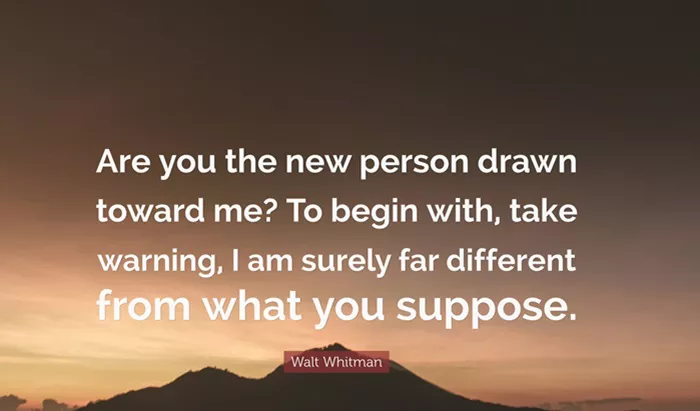Welcome to Poem of the Day – Are You the New Person, Drawn Toward Me? by Walt Whitman.
Walt Whitman, one of America’s most celebrated poets, is known for his exploration of individuality, unity, and the interconnectedness of human experiences. In his poem “Are You the New Person, Drawn Toward Me?”, Whitman invites readers to reflect on the nature of attraction, connection, and self-awareness. This poem, though brief, offers deep insights into the complexities of human relationships. In this article, we will explain the poem’s themes, meaning, and significance.
Are You the New Person, Drawn Toward Me? Poem
To begin with, take warning, I am surely far different from what you suppose;
Do you suppose you will find in me your ideal?
Do you think it so easy to have me become your lover?
Do you think the friendship of me would be unalloy’d satisfaction?
Do you think I am trusty and faithful?
Do you see no further than this façade, this smooth and tolerant manner of me?
Do you suppose yourself advancing on real ground toward a real heroic man?
Have you no thought, O dreamer, that it may be all maya, illusion?
Are You the New Person, Drawn Toward Me? Explanation
Understanding the Poem’s Structure
“Are You the New Person, Drawn Toward Me?” is a short, free verse poem that exemplifies Whitman’s characteristic style. It does not follow a rigid rhyme or meter, allowing the ideas to flow freely and spontaneously. The poem is a direct address to a mysterious “new person,” creating an intimate and personal atmosphere. The speaker’s questions reflect his curiosity and openness to a new connection.
Themes of Attraction and Connection
At its core, this poem explores the theme of attraction. Whitman’s speaker is drawn to a person, and the question posed—“Are you the new person, drawn toward me?”—reflects an intense curiosity about the identity and nature of this person. This attraction is not just physical but also emotional and spiritual, suggesting that the connection goes beyond surface-level encounters. Whitman frequently writes about the idea that every individual is connected to the larger world, and in this poem, the speaker is searching for a meaningful bond with the “new person.”
The Role of Self-Discovery
The poem also touches on themes of self-discovery and personal growth. The speaker wonders if the new person is someone who can offer them new insights, or perhaps help them explore different aspects of their own identity. Whitman’s work often emphasizes the importance of self-awareness and understanding, and in this poem, the speaker is searching for someone who will both challenge and reveal deeper parts of themselves. The speaker’s introspection shows that relationships are a way to explore one’s own identity and place in the world.
The Mystical and Spiritual Connection
There is a sense of spiritual longing in the poem. The “new person” may symbolize a higher connection, a new phase in life, or even a new understanding of one’s purpose. Whitman’s poetry is often suffused with transcendental ideas, and in this poem, the speaker’s yearning for a deeper connection can be interpreted as a desire to understand the universe and one’s place in it. The new person is not just a physical being; they may represent a new chapter or awakening in the speaker’s life.
The Significance of the Question
The repeated question—“Are you the new person?”—creates an air of anticipation and mystery. It emphasizes the idea that the speaker is unsure of the nature of the connection and invites the reader to consider the possibility that life is full of unexpected encounters and revelations. This uncertainty about the person’s identity mirrors the larger uncertainties of life, where we may not always know what the future holds, but we are always drawn to new experiences, people, and moments of discovery.
Whitman’s Exploration of Human Identity
Whitman often wrote about the interconnectedness of all people, and in this poem, we see that theme echoed. The speaker’s attraction to the new person is not just about two individuals meeting; it is also about the larger human experience. The “new person” can represent anyone who enters our lives and helps us grow or discover something new about ourselves. Whitman suggests that every encounter, no matter how brief, is part of a larger journey toward understanding and unity.
Conclusion
Walt Whitman’s “Are You the New Person, Drawn Toward Me?” offers a profound reflection on attraction, connection, and self-discovery. Through the speaker’s questioning, Whitman delves into the complexities of human relationships and our search for meaning in the world. The poem invites us to consider the importance of every encounter in shaping who we are and how we relate to others. Whitman’s work continues to resonate because it speaks to universal themes of love, identity, and the quest for understanding. In this brief but powerful poem, Whitman reminds us that life is full of new connections, each offering the potential for growth and transformation.

